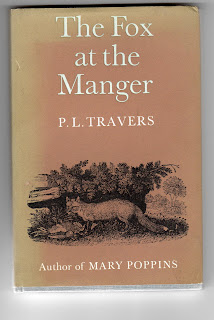.jpg)
I bought this book in 1964, when I was a student in Southampton. I was attracted by the exquisite Thomas Bewick wood engravings. I couldn't believe that I could own a book full of them for just a few shillings.
Later, reading the story, I discovered it is one of those special books that touches the child in each of us. The blurb inside the dustcover tells us: ".... it is for anyone, however sophisticated or simple, old or young, who is blessed with a sense of mystery or the gift of wonder."
It is a tale within a tale. Set in London in 1945, it describes a special carol service in St Paul's Cathedral, the first Christmas celebration since the end of the war. Three young children, close friends are there, each with an old, much loved toy to put under the Christmas tree for the poor children of London. This outer tale is beautifully told and took on a whole new poignance for me when I had children of my own, who among us hasn't cringed at the truthful but embarrassing 'whispered' comment of a child? The bishop, his chaplain, a host of clergy and the whole choir have processed into the cathedral in their full regalia; one of the three children "reached up an arm as strong as a wrestler's and dragged my head down to his. "Why," he asked, "are they wearing nightgowns? They look like Wee Willie Winkie." The bishop's gold crook trembled in the hand of the bishop's chaplain. I dared not catch his eye."
There are some wonderful conversations between the three boys:
"God can do anything. He can fizzle up the world in a frying pan."
"No, he's not married, the angels do the cooking."
"What I would like for Christmas is a black dog and a white dog like the ones on the whiskey bottle."
"My mother says I can have a pen-knife - but then, she's pre-war!"
And we have the agonies of parting with much-loved toys even if the cause is noble.
The tale-within-the tale is inspired by the Carol of the Friendly Beasts, sung by the choir. This ancient carol, based upon the legend that on Christmas Eve animals are given the power of speech, tells of the gifts that the donkey, cow, sheep and dove give to the child in the manger. As the narrator and her three young charges leave the cathedral and make their way through the bomb damaged streets of London, one asks, "Why weren't there any wild animals at the crib? Haven't they got something to give?" And we are transported to a midnight scene, two thousand years ago and the story of the fox.
 It is a magical tale and I used to read this section of the book to children without the outer story. At one time I dramatised it for a very successful school production. (I probably defied all kinds of copyright laws!)
It is a magical tale and I used to read this section of the book to children without the outer story. At one time I dramatised it for a very successful school production. (I probably defied all kinds of copyright laws!)
The book has been out of print for many years but, if you can find an old copy, I predict it will become a treasured possession.
The author's name rang a bell, but since there was nobody home to answer it, I googled and found she wrote "Mary Poppins" that's why it was familiar. Whimsy isn't a favorite of mine, I prefer the fantasy of 50's sci-fi or the fairy tales we read as children.
ReplyDeleteLike you I've probably read thousands of books. My favorites are the 19th century English, Russian, German, American writers whom I truly love, for their mastery of the language if not for their story telling abilities although they are marvelous as well. Among contemporaries, there are some who are a match to the giants. I particularly like Louis Auchincloss who wrote about New York society and Tom Wolfe whose early books are so hilarious they are a health hazard if read while eating or drinking.
I also admire Maeve Binchy for her control of the language and feel that I've not only been to Dublin and environs, but actually lived there in another life, so well does paint the scene.
By early twentieth century, much, if not most, fiction became slanted to the left and politically correct, so I mostly stay away from it for fear of apoplexy.
Now I've drawn a blank.
I'm not sure that whimsy is the exact description for this particular book - it has an obvious element of fancy but it is thoughtful rather than playful. I'd class it with Oscar Wilde's "Selfish Giant." The narrative part of the story is really worth reading by any parent - all kinds of memories of events with your own children spring to mind.
ReplyDeleteI don't know all the books you mention but will enjoy looking them up. I do like Maeve Binchy, especially 'The Evening Class.'